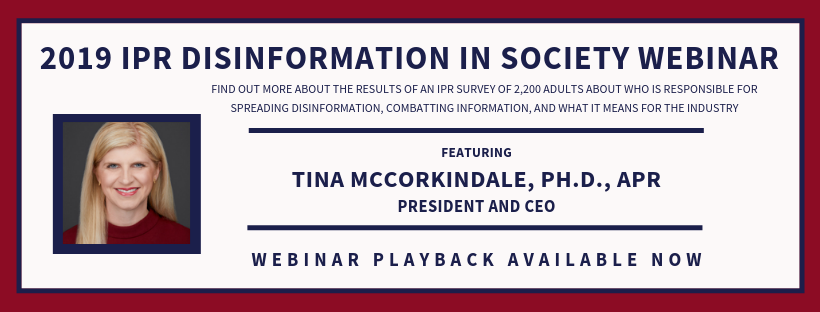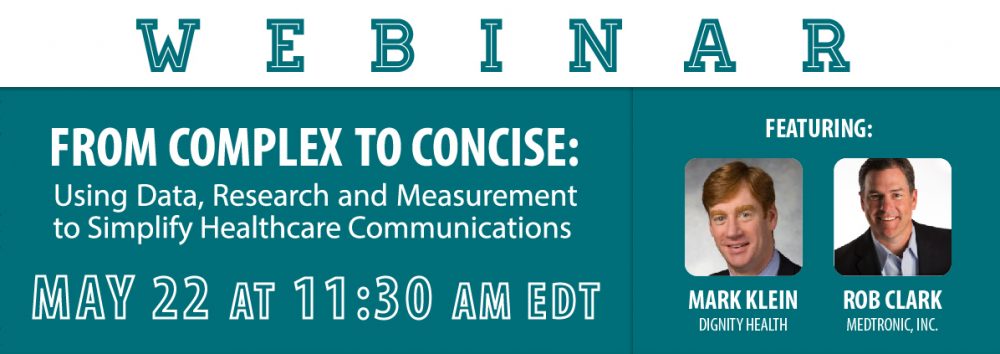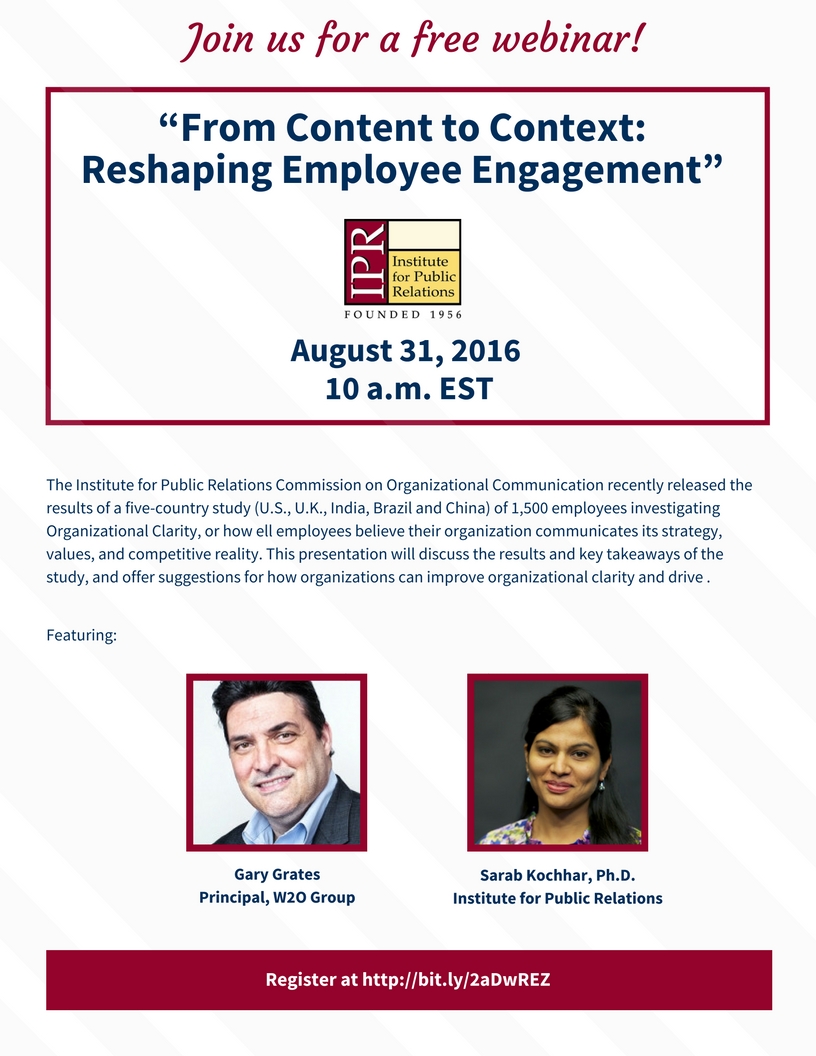IPR WEbinars:
IPR hosts a series of free webinars each month on the latest PR research that will impact the future of the profession.
Register below or watch a playback of a previous webinar.
If you have any questions, webinar ideas, or are interested in hosting an IPR Webinar, please contact Brittany Higginbotham at brittany@instituteforpr.org.
Upcoming Webinar:
Join us for an insightful discussion on the findings from the new report, Navigating a Changing Media Landscape, conducted by the Institute for Public Relations (IPR) and Peppercomm. As newsrooms shrink and disinformation spreads, Chief Communications Officers (CCOs) and media relations experts are facing unprecedented challenges.
The webinar will delve into key insights from interviews with CCOs and media relations experts, highlighting how the evolving media landscape is shaping the communications function. Topics will include the challenges of misinformation, effective measurement strategies, and the importance of educating stakeholders about the media environment. The session will also offer predictions about the impact of the future media landscape.
Don’t miss this opportunity to learn how industry leaders are navigating these shifting dynamics and what it means for the future of communications.
IPR Webinar Archive:






Explore our Webinar library below:
BEHAVIORAL INSIGHTS RESEARCH
Over the past decade, the media landscape has undergone dramatic shifts that impact not only the way Americans source and consume information but also the degree to which that information has influence over their lives. The pervasive 24-hour news cycle, the growing prevalence and reliance on social and digital media, disinformation fueling polarization and chronic crisis fatigue have led to reduced engagement with “traditional” news sources and widespread distrust of news media.
HUNTER, a leading marketing communications agency known for earning consumer attention and managing corporate reputation, sought to understand how these shifts are impacting Americans purchasing decisions.
In partnership with Libran Research & Consulting, HUNTER conducted a study exploring “Influence in America.” The study, conducted in Q4 2023, is a comprehensive look at which information sources play the biggest roles in influencing purchase choice and if and how these sources of influence vary across product sector and key demographic segment. Watch the recording to dive into the study’s findings.
Resources:
Download the report, here: https://hunterinfluencestudy.com
In an era inundated with information, deciphering fact from fiction has become an ever-growing challenge. Watch the webinar recording of the IPR-Leger 4th Annual Disinformation in Society Report, where we unraveled the layers of disinformation’s impact on society, explored its repercussions, and provided actionable insights to rebuild trust.
Key Highlights:
Expert Perspectives: Delve into the report’s key findings with Dr. Tina McCorkindale, APR, IPR President & CEO, and gain valuable insights from IPR Trustee Dave Scholz, Chief Strategy Officer of Leger. As industry leaders, they provided expert perspectives on the evolving landscape of disinformation.
Real-world Applications: Gain actionable insights that go beyond theory. Dr. McCorkindale and Dave Scholz not only discussed the findings but also provided real-world applications, enabling communicators to implement effective strategies in their respective fields.
Click here to view resources in the IPR Disinformation Resource Library.
In today’s social-first world, where pressing issues demand immediate action, brands are facing a heightened sense of urgency to address these challenges. Gen Z, in particular, feels a deep responsibility and urgency to fight for their future, making their cultural influence more significant than ever before.
This webinar will feature some of Edelman’s latest research on the paradigm shift of belief-driven buying and the emergence of brand democracy influenced by Gen Z consumers.
Some Key Findings:
– Gen Z consumers exert a gravitational force that disrupts the traditional marketing funnel, with brands needing to take action aligned with their values, as demanded by nearly two-thirds (approximately 62%) of Gen Z consumers.
– 70% of Gen Z individuals are actively involved in social or political causes, demonstrating their commitment to shaping a better future.
– Gen Z controls the information flow through platforms like TikTok, with participation rates of 69% posting or sharing content online daily or weekly, compared to 31% for those age 42+.
– Gen Z places strong trust in the credibility of experts (66%) and frequent users of a brand (63%) as brand spokespeople.
Discover how Gen Z’s belief-driven buying behavior, social activism, and expectations for brand action are reshaping the marketing landscape, providing essential knowledge for brands and businesses to thrive in this evolving social-first world.
Watch the recording of this webinar to gain valuable insights into the immense power of Gen Z and their influence on the future of the communications industry.
Resources:
In this webinar, Tina McCorkindale, Ph.D., APR from the Institute for Public Relations, Dr. Terry Flynn, APR, FCPRS from McMaster-Syracuse University; Dave Scholz from Leger, and Anetra Henry from the Institute for Public Relations (IPR) will discuss the findings from the IPR “Disinformation in Canada” study, which examines and tracks how disinformation — defined as deliberately misleading or biased information — is spread in Canada in comparison to the United States.
What do you do when your business gets pulled into a mis- or disinformation narrative? Do you stay silent and wait to see if it goes away? Do you respond immediately, using the same crisis response handbook you’ve used for the past ten years?
From COVID conspiracy theories to stock market manipulations, 2021 calls for a more proactive – and more strategic – approach to defending your business from the very real consequences of online narratives. Anticipating these risks before they happen, analyzing them in the moment, and having a plan to act is critical.
Join this session to learn how the changing media environment is creating the perfect conditions for narratives (good or bad) to take root, how experts spot emerging narratives, and ways you can build a successful strategy for combating misleading narratives online.
How can organizations better understand stakeholder perceptions of vaccinations and how does that influence vaccine confidence?
In this IPR webinar, IPR President and CEO Dr. Tina McCorkindale examines critical theories and models that increase vaccine uptake will be addressed as well as the indirect costs of vaccinations, effective message framing strategies, and intervention/incentive strategies for success. Finally, best practices of organizations will be spotlighted.
Join IPR President and CEO Tina McCorkindale, Ph.D., APR, as she shares more insights into the IPR 2020 Disinformation in Society Report. The webinar will explore the prevalence of disinformation in the U.S., the parties most responsible for sharing disinformation, the level of trust the American public has for different information sources, and whose job it is to combat disinformation.

Sixty-three percent of Americans view disinformation—or deliberately misleading or biased information—as a “major” problem in society, on par with gun violence (63%) and terrorism (66%), according to the 2019 Institute for Public Relations Disinformation in Society Report.
The 2019 IPR Disinformation in Society Report surveyed 2,200 adults with Morning Consult to determine the prevalence of disinformation, who is responsible for sharing disinformation, the level of trust in different information sources, and the parties responsible for combatting disinformation.
Learn more about disinformation’s role in society in this free webinar featuring IPR President and CEO Dr. Tina McCorkindale.
One of the most exciting areas in research today is how behavioral science can help us better understand stakeholder decision making and behavior. This webinar provides an overview of the promising areas of research in behavioral science and its application in organizations, specifically communications and marketing. Best practices, case studies, and examples of behavioral science research from multiple perspectives will be presented.
Digital Media & Emerging Technology
In the rapidly evolving world of public relations, AI-powered answer engines became key players in shaping brand reputation. These advanced systems changed how brands were discovered and perceived online. Communication leaders had to adapt to this new digital landscape to control their brand narrative and visibility. This one-hour panel discussion brought together industry leaders to explore the implications of AI-driven search on brand reputation management. The panel shared actionable strategies to stay ahead of the curve in this dynamic environment.
Key Topics:
- The Rise of AI-Powered Answer Engines: Participants understood how these technologies differed from traditional search engines and how they transformed the digital landscape.
- Impact on Brand Reputation and Visibility: Strategies for managing brand reputation in AI-driven search were discussed, ensuring that brands remained prominent and well-regarded.
- Adapting Content Strategies for AI: Attendees discovered how to adjust content strategies to maintain relevance and visibility as AI search evolved.
- Future Trends and Preparation: Expert insights were shared on upcoming trends in AI-powered search and how to prepare brands for the next 3-5 years.
Unique new ways to promote your events are constantly popping up; from TikTok and LinkedIn Conversation Ads, to influencer marketing and podcasts, the options can be endless. So, how do you know which channels are right for your event and organization? How can you best incorporate these innovative tactics into your marketing and event strategy?
Rewatch this webinar with Cvent to learn how to use new channels to tell your brand story and promote events.
Key Takeaways:
• Get fresh ideas on channels and tactics you can use today, and in the future
• Find tips on amplifying your brand’s reach
• Discover new ways to repurpose content and extend your event lifecycle
In this webinar, Brooke Gracey explained how the team at Cvent used ChatGPT to create a webinar that was so good, it had people lining up to attend (virtually, of course). She shared the details on how to craft a killer title, create engaging content, and promote virtual events to the right audience. She also discussed key metrics tracked, and how to use those insights to optimize webinar performance.
Rewatch this webinar to get answers to questions like:
- How can AI be used to ideate topics, build the abstract, and write the content outline and script?
- What are some ways that AI can be used to help promote virtual events? Can audiences distinguish between AI and human input?
- Does using AI actually save time or does it add to the workload?
Resources:
Featured Speaker:
Brooke Gracey is a Marketing Director, leading a global campaigns team at Cvent. Brooke is known for her extensive event technology experience and is often sought as a subject matter expert, helping event professionals understand how to integrate technology into planning, execution and event marketing. She has a passion for emerging technology and has led several innovative event marketing and activation projects including Virtual Reality. When Brooke is not working, she is going on adventures with her partner, Tonya, and three wonderful fur babies.
In this webinar, Dr. Candace Parrish, Assistant Professor at Penn State University, explores how communicators can leverage virtual reality (VR) storytelling to create new realities for all communities.
Researchers across the disciplines have demonstrated that immersive media can increase empathy, which is a prerequisite to social justice activism. This session will draw from Dr. Parrish’s experience using VR to further the goals of media literacy education and social justice activism.
Parrish earned an interdisciplinary Ph.D. related to the areas of public relations, health communication, and visual communication from Virginia Commonwealth University. She also spearheaded the initiative to develop and launch the first VR-enhanced (virtual reality) online strategic communications and public relations master’s program at Sacred Heart University.
Resources Shared:
In this IPR Webinar, Matt Medved, Co-Founder, CEO, and Editor-in-Chief for nft now, an award-winning Web3 digital media platform for NFT coverage and curation, joins the Institute for Public Relations to discuss how NFTs and Web3 are shaping the future of digital communications. Watch this playback to understand insights digital communicators need to know to succeed in the fast-paced world of NFTs and Web3.
Learn more about nft now: https://nftnow.com
Check out key moments from the webinar:
During the past year, meeting and event professionals across the globe were forced to adapt to the “new normal” of virtual events. Although most of us missed our in-person meetings, we discovered some advantages of virtual events like extended reach and accessibility. This has unlocked new opportunities for organizations to build valuable relationships with their customers, prospects, and other constituents through live events- both virtual and in-person. We are entering the era of year-round live engagement programs and it’s important to find a long-term virtual event solution that enables you to deliver best-in-class content, connect your audience members, build community, and allow for sponsor activation opportunities along the way.
In this IPR webinar, we’ll share tips and best practices on how to improve your virtual event channel so you can deliver great virtual events that your attendees will love.
In this webinar, you’ll learn:
-The latest technology trends impacting the virtual world
-The ongoing role of virtual events in your total event program
-How to build an engaging virtual event your attendees will love, and how to connect them with each other
-Best practices from industry peers for virtual events of all sizes
Approximately half of social media managers say they work more than their colleagues and plan to leave their current role within two years, according to a new study of social media managers. The Institute for Public Relations, Ragan Communications, and the University of Florida partnered on a survey of more than 450 social media professionals about their career path, including the challenges and opportunities that lie ahead. The report focuses on the structure and budget of the social media function within organizations; the background, experience, and career path of the social media manager; and the job skills, work-life fit, and performance of the social media manager.
This IPR Webinar features Diane Schwartz, Ragan Communications, Dr. Marcia DiStaso, University of Florida, and Dr. Tina McCorkindale, as they discuss the key findings from the report and what the future looks like for the future social media managers.
The Makovsky Master’s Thesis of the Year Award recognizes and encourages graduate study and scholarship in public relations through an annual competition to find the best master’s thesis. This webinar will feature the four finalists and their outstanding thesis presentations.
Featuring:
—Connecting a Global Capability Framework for PR and Communication Management to Organizational and Cultural Socialization by Luis Fernando Vergara Arietta, University of Oklahoma
—How PR Agencies Communicate Diversity and Inclusion Practices on Their Websites by Gloris Trujillo, University of Alabama
—The Rise of Intelligent Machines: How Artificial Intelligence is Transforming the PR Industry by Manuelita Maldonado, University of Southern California
When you hear loud voices proclaiming that new technology is going to radically transform industries for better or worse, you know that you’re onto something big. Blockchain technology is the next big thing to hit the PR industry.
Blockchain technology—the innovation that supports the Bitcoin cryptocurrency protocol and so much more— will have a greater impact on the communications and marketing trade within the next five to ten years than social media did from 1995 to 2005.
In this webinar, Phil Gomes, Chief Communications Officer of Bloq, will walk us through blockchain, what’s at stake, what’s happening today, and what is yet possible.

With Data and Intelligence: Coping in a VUCA world
In an environment that is increasingly dominated by disruptive, fast-evolving technology, professional communicators are confronted with ever new challenges and opportunities.
Continuous and accelerating change is the new normal. Social media and smart devices have completely changed the playing field of PR within just a few years. Paid, earned, shared and owned media become one and the same in a user’s experience. At the same time, there is growing evidence that the way in which we pay attention and are affected by information is much less conscious and rational, and much more instinctive and affective, than we realize.
Watch this webinar presented by IPR Measurement Commission members Ana Adi, Ph.D. from Quadriga University, and Thomas Stoeckle, host of the Small Data Forum Podcast.
In this webinar, they address skills and capabilities requirements for successful communicators of the future. They also teach you about the latest thinking regarding systematic data-led planning and execution of communication activities, as well as examples of measurement and evaluation best practices.
DIVERSITY, EQUITY, AND INCLUSION
This IPR Webinar is based on a new IPR Signature Study provided by the IPR Center for Diversity, Equity, and Inclusion.
The Institute for Public Relations recently released a study exploring the relationship between Chief Diversity Officers (CDOs) and Chief Communication Officers (CCOs) and the impact their relationship and work has on the organization.
Understanding how organizations communicate about their overall DEI initiatives is important as noted by a recent Page Society study that found diversity, equity, and inclusion was both a top concern and an opportunity for members of the C-suite. Given the significant roles and responsibilities of CDOs and CCOs, understanding their functions and the dynamics of their relationship is paramount.
Watch the playback for a deep dive into the report findings and discover what the study participants say lies ahead regarding DEI.
Resources:
Download the Full Report: https://instituteforpr.org/ipr-cco-cdo/
Learn more about the IPR Center for Diversity, Equity, and Inclusion: https://instituteforpr.org/center-for…
Founded in 1956, the Institute for Public Relations is a 501(c)(3) nonprofit foundation dedicated to fostering greater use of research and research-based knowledge in public relations and corporate communication practice.
IPR is dedicated to the science beneath the art of public relations.™ We create, curate, and promote research and initiatives that empower professionals with actionable insights and intelligence they can put to immediate use.
In this new report, the Institute for Public Relations and Voya Financial teamed up to examine employee perceptions about how well their organization supports, communicates and creates an inclusive culture for people with disabilities and their caregivers.
In this webinar, Dr. Tina McCorkindale and Paul Gennaro shared the report’s findings and some recommendations for how employers can become more inclusive.
Some Key Findings:
– More than half of people with disabilities have witnessed or experienced both macroaggressions and microaggressions toward individuals with disabilities at least a few times a year in the workplace.
– 40% of employees were not familiar with their organization’s position or strategic plan related to disabilities in the workplace.
– Only one-third said their company features individuals with disabilities in their commercials or advertisements even though employees wanted to see more.
To learn more about the report, please join us on this webinar.
Panelists:
Tina McCorkindale, Ph.D., APR, is the President and CEO of the Institute for Public Relations, a nonprofit research foundation that creates, curates and promotes research and initiatives in the public relations industry. She has taught as a full-time and adjunct professor for more than 20 years with 10+ years of experience working in corporate communication and analytics.
Paul Gennaro is the Chief Brand and Communications Officer for Voya Financial (NYSE: VOYA). Gennaro has held top global roles for much of his career, overseeing more than 50 M&A-related transactions, an award-winning initial public offering on the New York Stock Exchange, a CEO transition, a global rebrand, and multiple new business launches and integrations.
Resources:
Canada’s Accessibility Standard
The 2023 Edelman Trust Barometer delves into today’s biggest challenges to identify opportunities for building trust, unity, and common purpose, and provides a guide for CEOs and other societal leaders to build cooperation in a polarized, fragmented world.
The webinar featured an overview of the 2023 Edelman Trust Barometer report presented by Margot Edelman, Deputy General Manager of Edelman’s New York Office.
Following the presentation, Eleanor Hawkins, Communications Strategist & Writer of Axios, moderated a panel (below). A Q&A follows.
–Oscar Suris, President, Edelman New York
–Arielle Patrick, Chief Communications Officer, Ariel Investments
–Trity Pourbahrami, Communications Officer, Science Programs, Gordon & Betty Moore Foundation
Download Presentation Slides: 2022 Edelman Trust Barometer Special Report
Edelman studied trust for more than 20 years and believe that it is the ultimate currency in the relationship that all institutions—business, governments, NGOs and media—build with their stakeholders. The 2022 Edelman Trust Barometer is their 22nd annual trust and credibility survey. The survey was powered by Edelman Data & Intelligence (DxI) and consisted of 30-minute online interviews conducted between November 1 and November 24, 2021. Read more about the Edelman Trust Barometer here: https://www.edelman.com/trust/2022-trust-barometer!
Webinar Playback:
Workplace burnout is a growing problem in many professions, including the communications industry. In this IPR Center-led webinar, Patrick Thelen, Ph.D., APR, Laura Lemon, Ph.D., APR, and Emily Graham will discuss effective strategies to help employees and leaders combat burnout and stay motivated in their careers.
The Institute for Public Relations Center for Diversity, Equity, and Inclusion and The Wakeman Agency conducted a survey of 393 communications and public relations leaders to study diversity, equity, and inclusion (DEI) perceptions and definitions from March 17 – April 12, 2021.
The goal of this study is to spark conversation and increase awareness of the implications of fully embedding DEI into an organization and how it supports or hinders efforts geared toward transformation, internally and externally.
In our upcoming webinar, join report authors Vanessa Wakeman, CEO of The Wakeman Agency, and Dr. Tina McCorkindale, President and CEO of the Institute for Public Relations as they discuss the key findings of the survey and suggested definitions for frequently used DEI terms in organizations, including diversity, equity, equality, inclusion, and social justice.
Link to the full report: https://instituteforpr.org/defining-diversity-equity-inclusion-report/.
The democratization of information is accelerating. Healthcare consumers are actively seeking out an ever-wider range of information from an expanding range of resources, influencers, and voices to proactively manage their health. But according to The Fluency Report: Health Literacy by Syracuse University Newhouse School of Public Communications and W2O Emerging Insights Lab, companies are not the go-to source. Leading this webinar is Abby Hayes, Practice Leader of DE&I Engagement at Real Chemistry and Jason Davis, Research Professor in the Office of Research and Creative Activity at Syracuse University’s Newhouse School of Public Communications.
Every day content is published that’s inaccessible to many. Campaigns are launched that aren’t designed to be inclusive of people of all abilities, such as those with sight, hearing, speech and cognitive impairments. Over a billion people – one in eight of the world’s population – have some form of disability, making them a significant audience to exclude by default or design.
Based on the recently released study, Making Communications Accessible by Design by Current Global, this IPR Webinar provides an overview of why communicators have a moral and financial imperative to change, along with helpful resources for how to create more inclusive content and campaigns.
In celebrating the 20th Anniversary of the [revised} PRSA Code of Ethics, scholars, and practitioners will gather together to discuss the emerging ethical issues in public relations. In collaboration with PRSA Educators Academy, AEJMC Media Ethics Division, and our generous host, Institute for Public Relations, we welcome Dr. Erica Ciszek from UT Austin, Nina Smith from PoliSol Public Affairs, and Dr. Nneka Logan from Virginia Tech for a conversation on what’s ahead for public relations in a very curious environment that we affectionately refer to as “the new normal.”
Download Research Brief: Research Brief: Intercultural Competence
Download Presentation: Solutions – Intercultural Competence
Despite incremental efforts to increase training and education for leaders in the area of diversity and inclusion, there is little agreement across the industry about the core competencies needed by leaders to manage more diverse, globally astute organizations and communicate effectively with diverse publics.
What types of education or training resources do leaders in PR need to strengthen their competencies toward diversity and inclusion? Research supported by the Arthur W. Page Society opens a conversation for senior leaders to assess their assets and build the ideal competencies needed to effectively practice diversity and inclusion.
In this first part of a two-part study, KPMG and the Institute for Public Relations (IPR) conducted a series of focus groups with female and male executives and mid-level leaders in agencies and corporations to find out their views on mentorship, leadership, work-life integration, workplace policies, and their ascension to the top. Both groups gave solutions for how to boost women in leadership in the profession. The results may surprise you!

Download Slides (PDF): Taking a Stand on Social Issues: The Evolving Roles of CMOs and CCOs
Many Chief Marketing Officers (CMOs) and Chief Communications Officers (CCOs) are now leading the way to give their organizations a social voice, both internally and externally, with employees, customers and clients. Companies are more comfortable with uncertainty and are spending more time addressing social topics that may, or may not, be related to their core business but are guided by their organizational principles and values.
Our special guest presenters—Southwest’s CCO, Linda Rutherford, and Peppercomm’s co-founder and CEO, Steve Cody— will share their adept perspectives of the shifting roles as a result of the current volatile social, cultural and political climate and will discuss the findings of our third study co-branded with Peppercomm.
Download Presentation: IPR Webinar: Millennials @ Work: Perspectives on Reputation, Diversity and Inclusion
Sponsored By:

Millennials now represent the largest generation in the work force (35%), and they will be leaders in organizations and in the public relations profession for several decades. It’s no secret that Millennials place importance on diversity and inclusion (D&I) when considering a new job. 47 percent of Millennials consider the D&I of a workplace an important criterion in their job search compared to 33 percent of Gen Xers and 37 percent of Boomers.
Reputation is another top priority for Millennials when it comes to their careers. They place a higher value on building and maintaining a positive digital presence as a reputation booster at work compared to the other generations. One in five Millennials believe both their work and social media reputations are equally important.
Join Chief Reputation Strategist of Weber Shandwick and IPR Trustee, Leslie Gaines-Ross, and IPR Director of Research, Dr. Sarab Kochhar, with Millennials Josh Ferrariand Maddi Messner as they discuss and analyze the stigma around this age group and what they really seek out of a workplace.

Environment, Social, and Corporate governance research
In this #IPRWebinar, our panelists delve into the insights from the latest 2024 Edelman Trust Barometer – APAC Region Report. Margot Edelman, General Manger of Edelman New York presents the findings from the report, which is followed by a moderated Q&A with industry leaders representing healthcare, technology, and business.
Discover the unique dynamics of the APAC Advantage and uncover the reasons behind why major Asian-Pacific markets stand out with greater levels of trust compared to their Western counterparts.
Watch the playback to understand the evolving trust dynamics in the APAC region.
Resources:
- APAC Report: https://edl.mn/4c16nfF
- APAC Top 10: https://edl.mn/48JJbzV
In this IPR Webinar, Thomas Stoeckle from Bournemouth University, UK, and Dr. Ana Adi from Quadriga University of Applied Sciences, Germany, present their global report, “The Future of PR/Comms and Their Social Impact.”
This report explores three key themes:
- Managing conflicting stakeholders and demands
- Understanding social value and social impact
- Addressing education within the public relations and communications landscape
Following their presentation, Brian Snyder of Axicom shares his expertise in artificial intelligence (AI) and explores its implications for the evolving landscape of the public relations industry as it relates to the findings from the report.
Resources:
Watch the IPR Webinar playback to unpack the findings from the 2024 Edelman Trust Barometer: A collision of trust, innovation, and politics. Discover how rapid innovation, while holding the promise of a prosperous future, introduces complexities that may heighten trust issues, further fueling societal instability, and political polarization.
The webinar featured an overview of the 2024 Edelman Trust Barometer report presented by Margot Edelman, General Manager of Edelman’s New York Office. Following the presentation, Eleanor Hawkins, Communications Strategist & Writer of Axios, moderated a panel featuring communication leaders representing technology, healthcare, and food & beverage:
- Kathryn Beiser, SVP & Chief Communications Officer, Eli Lilly
- Leslie Miller, CDO & CCO for Nutrition and Ice Cream NA, Unilever
- Stacey Jones, Chief Communicator, Honeywell
A company’s reputation is one of its most valuable assets. Reputation teams instinctively understand the importance of protecting and maintaining their company’s reputation. However, the changing landscape of reputation management is making it increasingly challenging for communication leaders to navigate today’s complex and data driven market, clouded by disinformation/misinformation.
Watch this #IPRWebinar Playback for an informative discussion about effective strategies to guide your team, C-Suite, and board of directors in optimizing your company’s reputation. Learn how to speak publicly, when to stay silent and take appropriate action, and how you can effectively leverage artificial intelligence (AI) to quantify financial risk and build more trust with key stakeholders.
In this IPR Webinar, Heather McGeory, Senior Director and Global Lead for Climate and Sustainability and Trevor Pearson, Senior Associate Director from APCO Worldwide discuss the latest on how your company can engage with the international climate meetings in Egypt (November 6-18) and across key moments in 2023. They also discuss opportunities with the passage of the Inflation Reduction Act and what that means for investment and public affairs. Founded in 1956, the Institute for Public Relations is a 501(c)(3) nonprofit foundation dedicated to fostering greater use of research and research-based knowledge in public relations and corporate communication practice.
HEALTH COMMUNICATION
How can organizations better understand stakeholder perceptions of vaccinations and how does that influence vaccine confidence?
In this IPR webinar, IPR President and CEO Dr. Tina McCorkindale examines critical theories and models that increase vaccine uptake will be addressed as well as the indirect costs of vaccinations, effective message framing strategies, and intervention/incentive strategies for success. Finally, best practices of organizations will be spotlighted.
The democratization of information is accelerating. Healthcare consumers are actively seeking out an ever-wider range of information from an expanding range of resources, influencers, and voices to proactively manage their health. But according to The Fluency Report: Health Literacy by Syracuse University Newhouse School of Public Communications and W2O Emerging Insights Lab, companies are not the go-to source. Leading this webinar is Abby Hayes, Practice Leader of DE&I Engagement at Real Chemistry and Jason Davis, Research Professor in the Office of Research and Creative Activity at Syracuse University’s Newhouse School of Public Communications.
The triple crises of the COVID-19 pandemic, the related economic downturn, and the urgent need to address systemic racism, are combining to upend peoples’ fundamental values, priorities and expectations, and profoundly test our trust in societal institutions.
Edelman released the 2021 annual Edelman Trust Barometer, the world’s most robust exploration of trust across 33,000 respondents in 28 markets, which examines today’s re-balancing of power, assessing which institutions are gaining and losing trust and providing insights to help CEOs and other leaders chart a path forward.
Presented by the Institute for Public Relations and Edelman, Arati Randolph, Executive Vice President, Public Affairs of Wells Fargo, Arielle Patrick, Chief Communications Officer of Ariel Investments, and Paul Gennaro, Chief Communications Officer of Voya Financial, explore the “infodemic,” how businesses and the financial service industry is performing against multi-stakeholder expectations, and the role of businesses and CEOs in this new environment.
In a world with unlimited supplies of vaccine and budget to support outreach, public officials could craft highly specific campaigns for each community and identity in the world. The vaccine would be simultaneously available to everyone, and our personal doctors would administer it and assure us of its safety and efficacy.
That world doesn’t exist.
The University of Florida recently held a “living literature review” with 16 social and behavioral psychologists, medical anthropologists, behavioral economists, neuroscientists, and political communications scholars to ask: What makes people resilient against misinformation? What drives vaccine hesitancy? Which frames will be most effective? What kinds of message strategies have been effective with specific communities? And finally, what are some of the best ways to make taking the vaccine a social norm? Eight principles emerged from those conversations that we believe can increase trust, acceptance, and demand for vaccination.
In this IPR webinar, Ann Christiano and Jack Barry from the Center for Public Interest Communications at the University of Florida, shared these principles and insights from a survey conducted in October to test them, along with examples of these principles in action.
With the staggered rollout around the world of the COVID-19 vaccine, compelling and targeted communications are central to increasing vaccine uptake. Employees and external audiences are increasingly depending on companies to be trusted sources for providing credible information and resources.
The Institute for Public Relations recently published an in-depth guide, “A Communicator’s Guide to COVID-19 Vaccines,” outlining research, theories, models, and research-driven recommendations for organizations to use when communicating about the COVID-19 vaccine.
Hosted by the guide’s author and IPR President and CEO, Tina McCorkindale this webinar shares some of the key findings from the guide.
As COVID-19 continues to threaten the health of millions worldwide, it also continues to significantly impact businesses and has led many corporate leaders to shift their priorities. For some, this means focusing more on internal engagement; for others, it necessitates a refreshed look at mobile technologies and the role they will play in this “new normal.”
The Institute for Public Relations and Peppercomm have released an in-depth e-book, “Leadership Perspectives: Leading and Looking Ahead Through COVID-19,” focused on critical topics affecting the public relations industry while looking ahead to the future of public relations and communication.
Presented by the Institute for Public Relations and Peppercomm, Moyra Knight, VP Communications, Corporate Citizenship & President Astellas Global Health Foundation of Astellas Pharma, Jennifer Witter, Chief Executive Officer/Founder of The Boreland Group Inc., and Jill Carapellotti, Group Vice President, Corporate of Macy’s, Inc., deep dive into the six overarching themes of the report.
Join HOK’s Firmwide Director of Interiors Tom Polucci and Director of Consulting Adam Stoltz as they discuss how to best prepare for the return to the workplace. COVID-19 will not only change the way we work, it will change how we engage with people and physical space. As we prepare to return to the workplace there are many elements we need to rethink, starting with our own personal readiness, the commute, access to the building, physical distancing, what we touch, and how we interact with each other.
A new social dynamic will be created with the potential for unease, increased anxiety, and conflict. To help people function at higher levels, feel more confident and at ease, we must not only address how we design the workplace but also create protocols and clearly communicate those with our colleagues. Returning to the workplace in an era of heightened sensitivity will take clear and decisive action, but we can create spaces that bring us together while keeping us apart.
Tina McCorkindale, Ph.D., APR, President and CEO of the Institute for Public Relations, and Steve Cody, Founder and CEO of Peppercomm and IPR Chair, will discuss the results the new study by IPR and Peppercomm that surveyed 300 communication executives and senior leaders to find out how their companies were faring in the COVID-19 pandemic.
This session will discuss findings of how vital the communication function is during this crisis, the most-trusted and suggested sources, how prepared communicators are for the crisis and its impact on the business, and which stakeholders they are most communicating to about changes and updates. The session will also share advice with business leaders about ways to tackle issues surrounding COVID-19.

Download Presentation: From Complex To Concise: Using Data, Research and Measurement to Simplify Healthcare Communications
It’s no secret: healthcare is complicated. From medical terminology and mile-long acronyms, to policy and business jargon, it’s challenging to boil down heavy subject matter into messages that are palatable enough for patients and concise enough for busy providers. Join seasoned healthcare leaders from Dignity Health and Medtronic, Inc. for a discussion on how using data, research and measurement can simplify your healthcare communications strategies, campaigns and messages. Through the lens of meaty healthcare topics such as Value-Based Healthcare, presenters will share proven tips to communicate more effectively with patients and provider audiences.
INTERNAL COMMUNICATION
We hosted an IPR Webinar on October 9 to explore the key findings from the new Commission on Public Relations Education (CPRE) report, “Navigating Change: Recommendations for Advancing Undergraduate PR Education.” This insightful session unpacked critical trends and recommendations shaping the future of public relations education, including:
- The reaffirmation of essential skills like writing, communication, and storytelling in PR education.
- The critical need for professionals to adopt a systemic ethical approach to the practice.
- Evolving industry expectations for future practitioners, including critical thinking, data fluency, and a deep understanding of DEI and social change.
- Recommendations for educators on adapting to changing student learning styles while maintaining excellence in pedagogy.
This report, the result of over a year of research from global PR educators and practitioners, highlighted six key industry expectations that future professionals must meet and offered guidance for educators to adapt to these evolving demands. Attendees gained the knowledge and tools to stay ahead in the ever-changing PR landscape and gained invaluable insights to help shape the future of PR education and practice.
View the full report: https://www.commissionpred.org/navigating-change-report/
The meaning of work has shifted, and employees across generational divides are demanding a reset. While trust in “my employer” is higher than any of the four main institutions Edelman surveys, employees are expecting more and their influence in the workplace is rising. This new reality is increasingly on the Board’s agenda as Directors are considering how to meet employee expectations and motivate talent for optimal outcomes.
Watch the playback to delve into the most current insights concerning employees and the role of the board of directors in corporate trust and reputation.
Featured Panelists:
Deidre Campbell has focused on communications in financial services for the last 25 years. In this capacity, Deidre leads integrated communications strategies to shape corporate reputation, showcase leadership, drive demand gen and advance major company initiatives including ESG and DEI. Focused on building trusted relationships, Deidre partners with financial services companies around the world to evolve their communications and marketing.
Lex Suvanto is CEO of Edelman Smithfield, a specialty firm focused on the financial markets and financial communications. He advises the senior management of public and private companies on transaction communications, shareholder activism, financial public relations, investor relations and crisis communications.
Jamie Fish is the Executive Vice President, Employee Experience at Edelman specializing in human insight driven approaches to global communications.
Resources:
In this webinar, Dr. Paul Melendez dives deep into the relationship between ethics, leadership, and the complex landscape of unethical behavior. He explores the fundamental drivers behind unethical conduct, provides a comprehensive objective model of analysis, and presents compelling real-world case study examples that translate theory into practice. Watch the playback to become a better leader able to navigate challenging ethical dilemmas.
Featured Speaker:
Paul Melendez, Ph.D.
University Distinguished Outreach Professor Founder, Center for Leadership Ethics
University of Arizona
Sean Brown, Director, Global Communications and External Relations – Strategy and Corporate Finance Practice, and Meagan Hill, Associate Partner from McKinsey & Company led this IPR webinar on leadership. In this webinar, Brown and Hill will discuss findings from CEO Excellence: The Six Mindsets That Distinguish the Best Leaders from the Rest.
This webinar is inspired by research from McKinsey & Company to identify CEOs who made a significantly measurable impact during their tenures, across over 20 years’ worth of data on 7,800 CEOs from 3,500 public companies across 70 countries and 24 industries. Register today to uncover the best skills and practices to drive extraordinary impact as a leader.
The success of an organization is largely determined by the quality of your talent. Hiring and retaining the right people for your company must be a top priority if you want to succeed in your field. Even with great vision and killer strategies, you won’t go far without the right people in the right seats doing the right things.
Instead of approaching the increase in resignations as an insurmountable problem, employers and leaders should look at this as a unique opportunity to re-assess, re-engage and redefine by using these tactics.
In this webinar, Kerry O’Grady will share some insights into the current state of the employment market and some of the most impactful strategies to help retain your best employees.
Speaker: Kerry O’Grady, Ed.D., Faculty Director and Professor, School of Continuing Studies, Georgetown University
The triple crises of the COVID-19 pandemic, the related economic downturn, and the urgent need to address systemic racism, are combining to upend peoples’ fundamental values, priorities and expectations, and profoundly test our trust in societal institutions.
Edelman released the 2021 annual Edelman Trust Barometer, the world’s most robust exploration of trust across 33,000 respondents in 28 markets, which examines today’s re-balancing of power, assessing which institutions are gaining and losing trust and providing insights to help CEOs and other leaders chart a path forward.
Presented by the Institute for Public Relations and Edelman, Arati Randolph, Executive Vice President, Public Affairs of Wells Fargo, Arielle Patrick, Chief Communications Officer of Ariel Investments, and Paul Gennaro, Chief Communications Officer of Voya Financial, explore the “infodemic,” how businesses and the financial service industry is performing against multi-stakeholder expectations, and the role of businesses and CEOs in this new environment.
As COVID-19 continues to threaten the health of millions worldwide, it also continues to significantly impact businesses and has led many corporate leaders to shift their priorities. For some, this means focusing more on internal engagement; for others, it necessitates a refreshed look at mobile technologies and the role they will play in this “new normal.”
The Institute for Public Relations and Peppercomm have released an in-depth e-book, “Leadership Perspectives: Leading and Looking Ahead Through COVID-19,” focused on critical topics affecting the public relations industry while looking ahead to the future of public relations and communication.
Presented by the Institute for Public Relations and Peppercomm, Moyra Knight, VP Communications, Corporate Citizenship & President Astellas Global Health Foundation of Astellas Pharma, Jennifer Witter, Chief Executive Officer/Founder of The Boreland Group Inc., and Jill Carapellotti, Group Vice President, Corporate of Macy’s, Inc., deep dive into the six overarching themes of the report.
Join HOK’s Firmwide Director of Interiors Tom Polucci and Director of Consulting Adam Stoltz as they discuss how to best prepare for the return to the workplace. COVID-19 will not only change the way we work, it will change how we engage with people and physical space. As we prepare to return to the workplace there are many elements we need to rethink, starting with our own personal readiness, the commute, access to the building, physical distancing, what we touch, and how we interact with each other.
A new social dynamic will be created with the potential for unease, increased anxiety, and conflict. To help people function at higher levels, feel more confident and at ease, we must not only address how we design the workplace but also create protocols and clearly communicate those with our colleagues. Returning to the workplace in an era of heightened sensitivity will take clear and decisive action, but we can create spaces that bring us together while keeping us apart.
Tina McCorkindale, Ph.D., APR, President and CEO of the Institute for Public Relations, and Steve Cody, Founder and CEO of Peppercomm and IPR Chair, discuss the results of a new study by IPR and Peppercomm that surveyed 403 communication executives and senior leaders to find out how their companies are communicating with and engaging their workforce during the COVID-19 pandemic.
Key topics include what are the most trusted go-to sources and channels for communicators, how the pandemic has impacted the workforce including employee satisfaction and productivity; what companies are communicating about and how they are tracking it; how diversity, equity, and inclusion initiatives have changed; how companies are preparing for the return-to-work; and best practices for internal communication during this crisis. (Aired April 21, 2020)

Tina McCorkindale, Ph.D., APR, President and CEO of the Institute for Public Relations, and Steve Cody, Founder and CEO of Peppercomm and IPR Chair, will discuss the results the new study by IPR and Peppercomm that surveyed 300 communication executives and senior leaders to find out how their companies were faring in the COVID-19 pandemic.
This session will discuss findings of how vital the communication function is during this crisis, the most-trusted and suggested sources, how prepared communicators are for the crisis and its impact on the business, and which stakeholders they are most communicating to about changes and updates. The session will also share advice with business leaders about ways to tackle issues surrounding COVID-19.
Presented by Dr. Melissa Dodd, University of Central Florida
Sponsored by the IPR Organizational Communication Research Center
This Institute for Public Relations (IPR) 2019 Future of Work Report investigates the future of work and the impact of several factors on the changing nature of work, including a rapidly and continuously shifting technological landscape, the growth of globalization and a contract economy, and the juxtaposition of new and tenured members of the workforce.
For this report, 25 executives to organizational/internal communication were interviewed to determine how they are strategizing around this new reality.
This webinar was presented by the IPR Commission on Measurement and Evaluation in coordination with AMEC’s North America Measurement Week. For too long, the focus for internal communications has been building and measuring employee engagement. But what exactly does this mean, and how do you raise employee engagement?
What Internal Communication professionals should be measuring are the components of engagement—21 to be exact, divided among:
- Outtakes (whether employees received, paid attention to, comprehended or retained particular messaging),
- Outcomes (evidence of changes to, or reinforcement of opinions, attitudes or behaviors),
- Organizational Impact (if and how internal communication has influenced organizational performance).
Recently codified by Sean Williams, Julie O’Neil, and their colleagues (see the February 2018 PR Journal) each grouping has specific standards that can be measured independently of each other and thus be tackled for improvement in many ways—words, symbols, actions, etc. All together, these 21 standards might define “engagement” but without measuring them independently, we really won’t know the root cause of an engagement problem. This session examines the 21 Standards and explore ways that measuring some (or all) can start a change effort all on its own.

In this webinar, the editorial team of the Institute for Public Relations’ Organizational Communication Research Center, Dr. Rita Men, Katy Robinson, and Patrick Thelen, will give an overview of the current issues, research trends and insights related to internal
communications. Recent studies on important issues such as leadership communication, internal use of social media, change communication, etc. will be reviewed and discussed.
Download Slides: Trends and Insights in Internal Communication (PDF)

